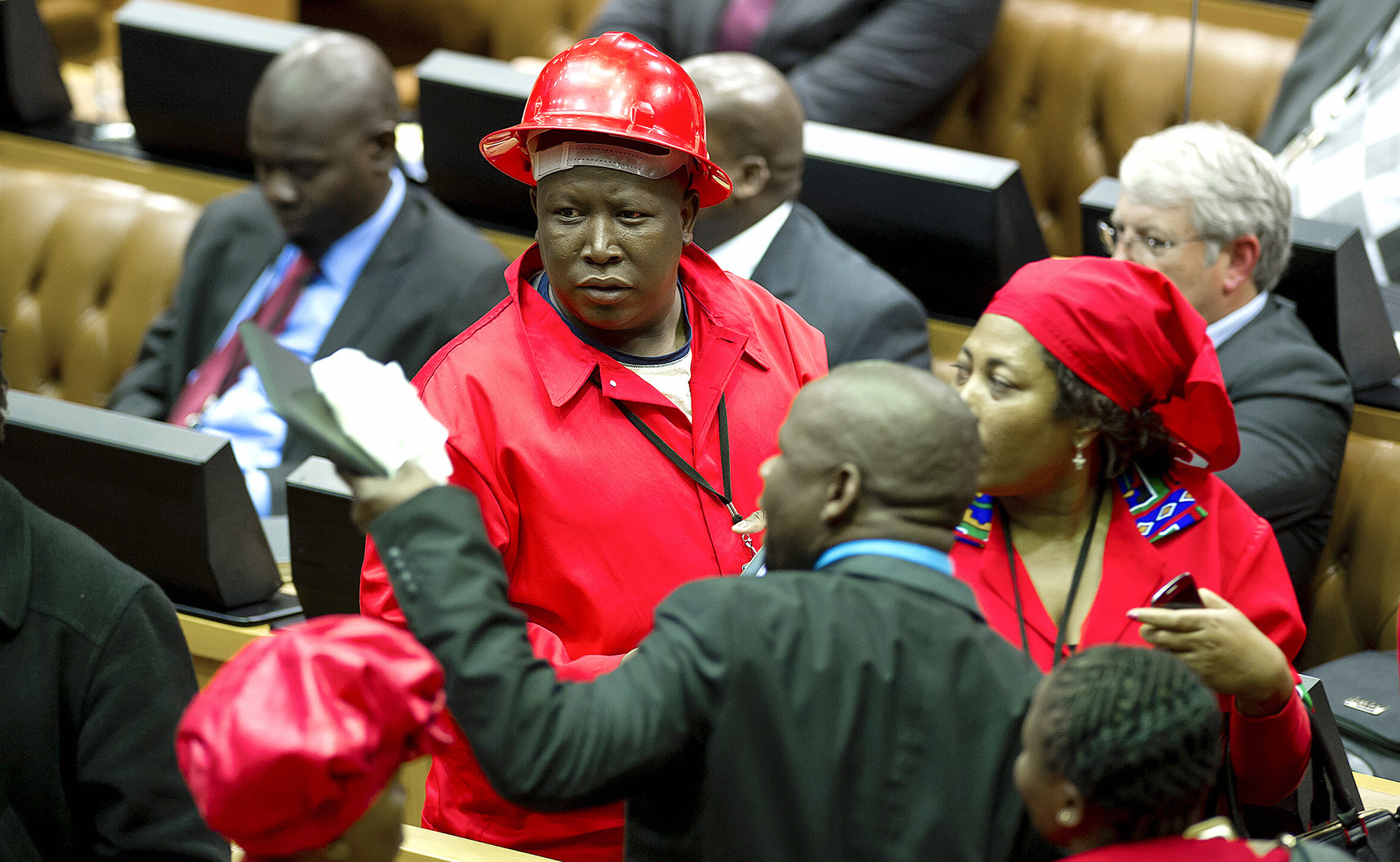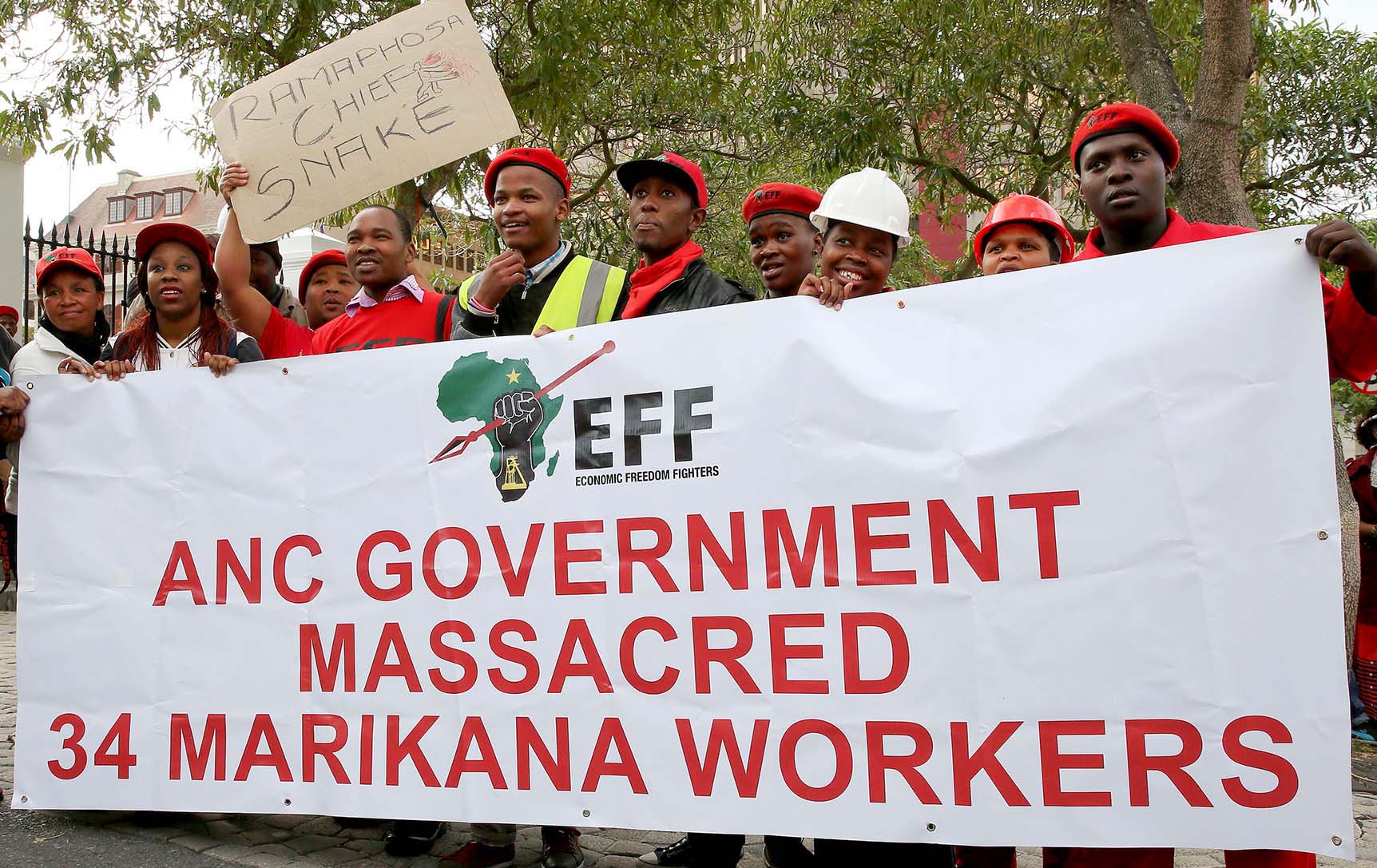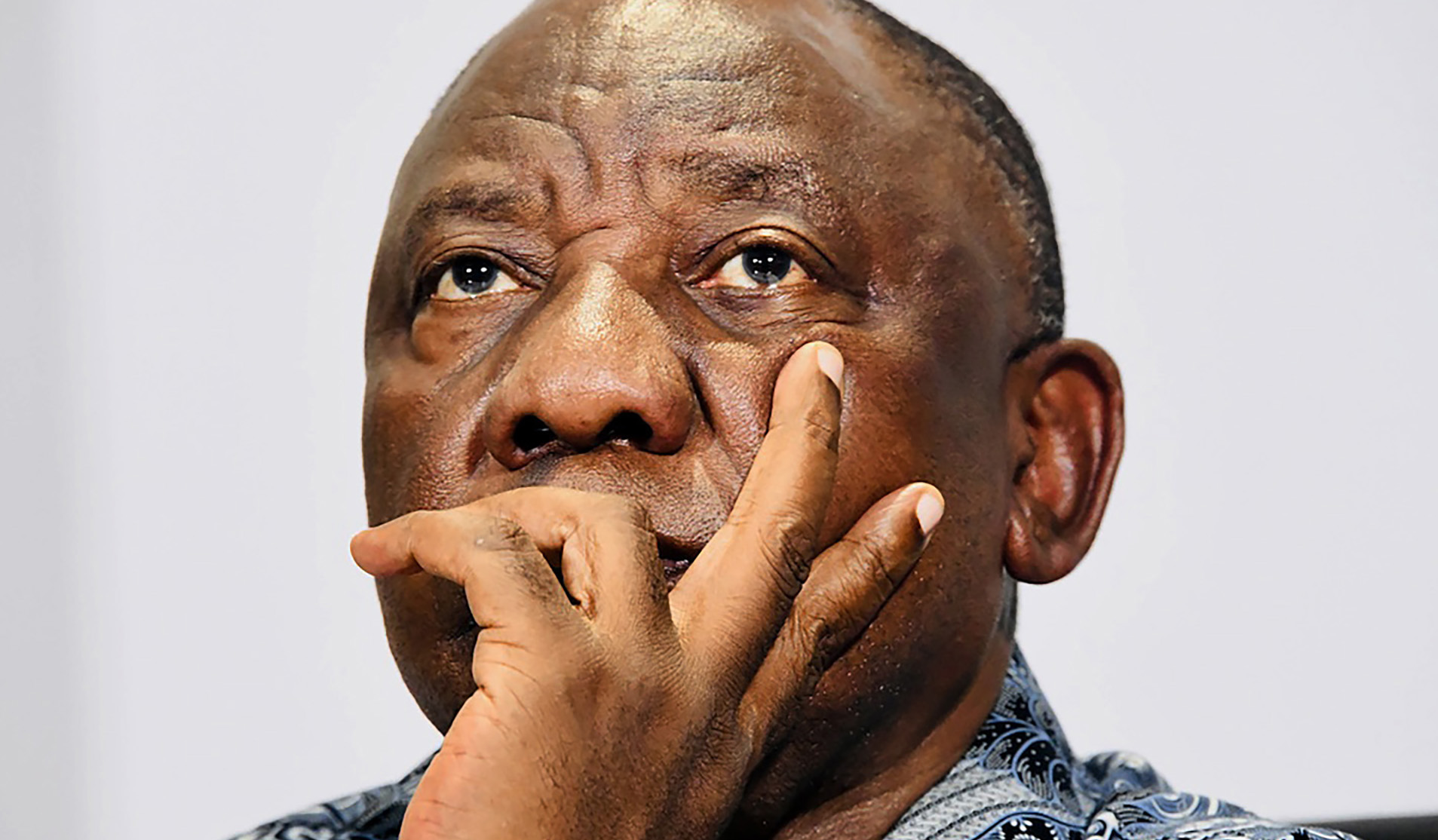Ten years on, survivors of the Marikana massacre and the families of those murdered by police continue to seek accountability and compensation from the South African state. Although the state has paid about R76-million in settlements to some affected families, many others continue litigation proceedings.
However, in a recent development, a case was brought by 329 survivors who seek to hold not the state, but President Cyril Ramaphosa personally liable for his collusive conduct which led to the killing of 34 strikers on 16 August 2012 (At the time of the massacre, Ramaphosa was both a majority shareholder and director of Lonmin, as well as deputy president of the country).
The affected workers applied to the Johannesburg High Court to seek damages of R1-billion from Ramaphosa and Lonmin (now owned by Sibanye-Stillwater).
In the first week of July 2022, Judge Frits van Oosten made a significant ruling that there was indeed sufficient evidence of complicity in the events that led to the deaths, for which Ramaphosa could be liable if proved so in subsequent court proceedings.
How the court concluded that Ramaphosa can be sued for the Marikana tragedy: Read an explainer here.
‘Toxic collusion’
The notion that there had been “toxic collusion” between the state and Lonmin to incite the police killing of 34 mineworkers was a key issue under scrutiny at the Farlam Commission of Inquiry, established to investigate the causes of the fatal shootings. It sought to assess whether Ramaphosa had used his political office to influence the police action leading to the deaths and whether or not this amounted to “toxic collusion”.
 EFF leader Julius Malema and party members leave the National Assembly during a debate on President Jacob Zuma's State of the Nation Address in Parliament on 19 June 2014. Malema was asked to leave after refusing to withdraw a remark accusing the ANC of murdering mineworkers in Marikana. (Photo: Gallo Images / Foto24 / Liza van Deventer)
EFF leader Julius Malema and party members leave the National Assembly during a debate on President Jacob Zuma's State of the Nation Address in Parliament on 19 June 2014. Malema was asked to leave after refusing to withdraw a remark accusing the ANC of murdering mineworkers in Marikana. (Photo: Gallo Images / Foto24 / Liza van Deventer)
Beyond Ramaphosa’s personal role, it’s hard not to be convinced that there was toxic collusion.
Not long after the dust of the lethal confrontation had settled, the mineworkers were not only blamed for the death of their comrades, the National Prosecuting Authority charged 259 surviving strikers with their murder under the legal doctrine of common purpose, a move typical of the apartheid regime to criminalise strike action under the Riotous Assembly Act. It reflected a flagrant abuse of the criminal justice system and misapplication of the law, which can only be explained as a collusion of political and corporate elites to protect themselves from scrutiny.
Hence, the idea of “toxic collusion” spread in public discourse, as depicted in one of Zapiro’s satirical cartoons that indicates Lonmin, unions, ministers and the police colluded in trying to sabotage the commission’s search for truth.
A spectacle also emerged around this topic when Ramaphosa was being cross-examined at the commission. In an evocative display, EFF members in the chamber rose and began to chant, “Blood on his hands! Ramaphosa must resign”. Proceedings were forced to adjourn and the headlines with those words seeped into mainstream media, offering a counternarrative to the state’s official line that the mineworkers were to blame for the killings for having behaved violently and striking illegally.
Unsurprisingly, the final commission report does not support the notion that there was any unseemly cooperation between Ramaphosa and capital. Instead, the report emphasises the criminality of the mineworkers.
But as Judge Van Oosten’s statement in July shows, surviving mineworkers are still trying to prove toxic collusion between Ramaphosa and Lonmin as a cause of their peers’ deaths. In his words:
“As counsel for the plaintiffs was at pains to emphasise, whether the plaintiffs will at the trial be able to prove those allegations is not relevant for present purposes. I am in agreement with counsel for the plaintiffs; the allegations as they stand do satisfy the test for factual causation.”
Why, 10 years later, do the survivors still want to see this done?
This saga raises an issue that extends beyond the question of justice or accountability. It captivates because we see the surviving mineworkers and their families trying to prove in legal terms something which has been a central motif of leftist theory about the state for more than a century, pointed out in foundational texts like the Communist Manifesto – that the modern state is but a committee for managing the affairs of the capitalist class. And as Marx states later in Capital: “Capital is dead labour that, vampire-like, only lives by sucking living labour, and lives the more, the more labour it sucks.”
It is this to which those EFF supporters were giving voice with their chants, during Ramaphosa’s cross-examination before the commission, that he had blood on his hands.
State and capital
Considering South Africa’s history of mining violence – physical and structural – Ramaphosa has incarnated the insidious relationship between the state and capital that is so emblematic of South Africa’s political economy, since the Dutch East India Company dealing in the slave trade and effectively establishing itself as government of the Cape.
So, last month’s statement by Judge Van Oosten is significant because if found liable for this in a court of law, and Ramaphosa is ordered to pay damages to the mineworkers, this would be welcomed as some kind of accountability.
Read more coverage of the Marikana massacre a decade later:
“The legacy of the Marikana massacre, ten years later”
“A decade since the Marikana massacre, a century since the Rand Revolt”
“The smell of blood comes back to me as I think of Marikana”
“A shameful decade of scandals haunts a rudderless SA Police Service 10 years after SA’s tragic day”
But we are also seeing in action a move typical in legalistic approaches, which is to individualise something which is, by its nature, a structural problem. On the one hand, we can see the possibility of the law being used to advance a popular struggle to reap accountability from one capitalist.
But on the whole, capitalists like Ramaphosa operate within a structure of laws, networks and customs that both reflect and support shared interests. Laws, like labour laws that govern strike action and so on, operate to contain workers’ grievances. It was those laws that presented the striking Marikana workers as criminals in the first place, for striking outside legally defined bargaining arrangements. While South Africa’s labour laws are either celebrated or bemoaned as some of the most progressive in the world, even progressive collective bargaining law accepts unquestioningly the desirability of maintaining the basic structure of a liberal capitalist order.
 EFF members outside Parliament on 20 June 2014 in support of leader Julius Malema, who was kicked out of the National Assembly the previous day after he refused to withdraw a remark that the ANC was responsible for the deaths of 34 miners at Marikana in August 2012. (Photo: Gallo Images / Nardus Engelbrecht)
EFF members outside Parliament on 20 June 2014 in support of leader Julius Malema, who was kicked out of the National Assembly the previous day after he refused to withdraw a remark that the ANC was responsible for the deaths of 34 miners at Marikana in August 2012. (Photo: Gallo Images / Nardus Engelbrecht)
These laws constrain the kinds of findings that can be made regarding personal liability for Marikana by legal bodies such as courts and commissions. Legal institutions, like judicial commissions and court proceedings, are concerned with whether or not laws have been broken. But what if those very laws are producing structural inequality, material deprivation and, of course, the Marikana Massacre itself?
The law needs to be understood as part and constitutive of the political economy, rather than us subscribing to positivist legal ideology which will have people believe that the law somehow sits neatly outside these power relations and that we are really all equal under the law. We can see, as Marikana shows us, that under the law some are more equal than others. It is only deprived workers who suffer as a consequence of labour legislation that limits one’s right to protest.
Marikana pushes us to interrogate this legal system that can, in many respects, still be seen to advantage the powerful, discipline the working class, and keep intact capitalist relations of exploitation; not to do away with law entirely, but to work to change laws to benefit the majority instead of an elite few. DM/MC
Claire-Anne Lester is a lecturer in Sociology at Stellenbosch University. This article forms part of a series on “Marikana, 10 years on”, of which she is an organiser. As part of the 10th anniversary of those fateful events, we have also organised a one-day symposium. The full programme is at the end of the live-stream YouTube link. If you’re in Johannesburg and plan to attend in person, register here.




 Members of the Economic Freedom Fighters (EFF) protest outside parliament on June 20, 2014 in Cape Town, South Africa. The EFF were protesting in support of their leader Julius Malema who was kicked out of parliament on 19 June after he refused to withdraw accusations at the ruling party African National Congress (ANC) for being responsible for the deaths of the 34 miners killed in Marikana in August 2012. (Photo: Gallo Images / Nardus Engelbrecht)
Members of the Economic Freedom Fighters (EFF) protest outside parliament on June 20, 2014 in Cape Town, South Africa. The EFF were protesting in support of their leader Julius Malema who was kicked out of parliament on 19 June after he refused to withdraw accusations at the ruling party African National Congress (ANC) for being responsible for the deaths of the 34 miners killed in Marikana in August 2012. (Photo: Gallo Images / Nardus Engelbrecht) 